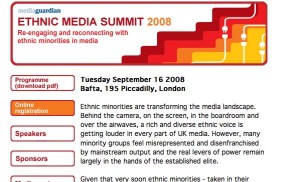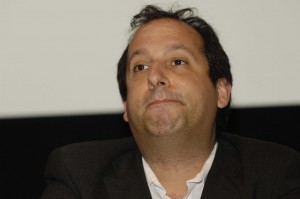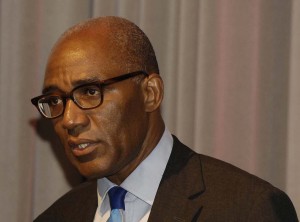The Guardian is conducting a feasibility study in the Manchester area as part of possible plans to launch a series of community news titles.
Alan Rusbridger, the paper’s editor-in-chief, has said it is too early to say if the scheme will go ahead.
The Guardian is conducting a feasibility study in the Manchester area as part of possible plans to launch a series of community news titles.
Alan Rusbridger, the paper’s editor-in-chief, has said it is too early to say if the scheme will go ahead.
Last night the British Society of Magazine Editors (BSME) named its 12 editors of the year along with a host of other awards, including an honorary award for publisher Felix Dennis.
Courtesy of the relaunched BSME website, here’s the full list of winners:
Editors of the year
Customer magazines (consumer readership) – Alec Marsh, Private Banking
Women’s magazines (monthly or less frequent) – Alexandra Shulman, Vogue
Women’s magazines (weekly or fortnightly) – Ali Hall, Look
Youth magazines – Beccy Bland, Sparkle World
Business & professional magazines – Danny Rogers, PR Week
Business & professional magazines (non-weekly) – Dickon Ross, Engineering & Technology
Men’s magazines – Dylan Jones, GQ
Entertainment & celebrity magazines – Mark Dinning, Empire
Lifestyle magazines – Maureen Rice, Psychologies
Special interest & current affairs magazines – Michael Harris, Golf Monthly
Newspaper magazines – Michelle Lavery, Telegraph Magazine
Customer magazines (business readership) – Paul Simpson, DCM
Others
Business magazine website of the year – Andre Rickerby, Drapersonline.com
Consumer magazine website of the year – David Moynihan, NME.com
The Mark Boxer Award – Felix Dennis
Editors’ editor of the year – Jane Bruton, editor-in-chief, Grazia
Art director of the year – Marissa Bourke, Elle
Launch of the year – Phil Hilton, ShortList
Campaign of the year – Rachel Downey, Time Out for Training campaign, Nursing Times
Innovation/Brand-building initiative of the year – Stuart Knott, Contact Sensory issue, Contact
The Fiona Macpherson new editor of the year – Tony Chambers, Wallpaper*
A year ago, the news aggregation website Newser.com launched. Former editor-in-chief of New York, Caroline Miller, talks to Media Bistro’s Fish Bowl NY about the site.
In the last session of the WAN/World Editors Forum 11th Readership Conference the speakers looked at shaping the future of the newspaper (information courtesy of WAN conference updates).
While Karen Wall, assistant managing director of Metro in the UK, focussed on good old print, arguing that the free newspaper model was growing, Christian Ortner the editor-in-chief of the regional newspaper Vorarlberger Nachrichten, in Austria, took the WAN audience through his newspaper’s decision to become the ‘Yahoo for local search’ in their area.
“Today Google has taken over search,” said Ortner. “Down to the small restaurant, Google is serving the local market.”
But he believes that “what happened in search need not happen for local news, services, parties, classifieds, restaurants, videos and other content.”
Vorarlberger Nachrichten Online is now aggressively pursuing online opportunities, forecasting that half its revenue will come from its digital platforms by 2011.
Here’s what the paper is developing, as told by Ortner:
So, it’s all change at the Times and Times Online.
Anne Spackman, as reported last week, is now the comment editor of the main paper, after a spell as editor-in-chief at Times Online since 2006.
That role is not being replaced. Instead:
Speaking in a press release, the Times’ editor, James Harding said: “Anne Spackman has done an extraordinary job at Times Online bringing our journalism to more people than at any time in our history.
“She has expanded the nature of what we do as a news organisation, introducing a 24/7 newsroom, launching The Times Archive and developing our podcasts, video and reader comments online”, he said.
Praising the new online assistant editor, Harding said that Tom Whitwell had “been one of the driving forces behind the phenomenal growth of Times journalism online and our audiences worldwide.”
This week’s Guardian Ethnic Media Summit, supported by Channel 4 and Spectrum Radio was the first of its kind. The event itself may be new, but the common theme of the day seemed to be, ‘weren’t we having these conversations 10 years ago?’

One of the speakers Claude Grunitzky talked about how the UK in 1996 had been a great place to be, to launch his magazine TRACE. Now, returning from the US – where he heads the TRUE Agency and the US edition of TRACE, and another publication TERRACE – he is not sure how much things have moved on. He went so far to say that the UK could be about 20 years behind in terms of ethnic representation in media. Ouch.
While many of the speakers focussed on the exciting times ahead for connecting with ethnic groups through social media (as we reported yesterday, Ofcom has found that the four main ethnic groups in the UK are using digital and online media more widely and diversely than the general population) there still seemed to be this pervading sense that some things hadn’t quite moved on.
News reporter Samira Ahmed, interviewed fellow Channel 4 colleague Aaqil Ahmed over his new appointment as the channel’s commissioning editor for religion and multicultural programming.
Her questions seemed to be weeding out whether this, too, might be a step backwards? After all, hadn’t the keynote speaker, Trevor Phillips, chair of the Equality and Human Rights council, just said that terms like ‘multicultural’ were dead?
“The feeling was that we need a champion,” Aaqil Ahmed answered. “The individual commissioning editors still want to make multicultural content, but alongside that I have a dedicated role.”
His advice, however, to young people from ethnic groups is to make other kinds of films before they try and reflect specific religious or ethnic content. He also cited BBC’s ‘Who Do You Think You Are?’ as one of the best multicultural programmes on television.
You can listen to the interview in full here (23 mins):
[audio:http://www.journalism.co.uk/sounds/AAquilAhmed.mp3]Various panel debates, with some big names in the ethnic (and mainstream) media world, discussed just exactly where we’re at, in terms of ethnic media: that’s on screen and off. Debates flitted between portrayal, participation and recruitment. It seems one feeds into the other.

Although actress and comedian Meera Syal and Observer news editor Kamal Ahmed didn’t show up, there were a host of other interesting people to listen to, among them: a panel of inspiring young people who have been involved in Live magazine through the Livity project; Leslie Bunder the founder of the SomethingJewish network (pictured above, courtesy of Richard Cooke, Guardian News and Media); Parminder Vir OBE, the award winning film and television producer; Joseph Harker, assistant comment editor at the Guardian; and Jay Kandola, director of acquisitions at ITV (but also previously at BBC, Channel 4 and 5).
Blogger and Asians in Media editor, Sunny Hundal, managed the proceedings, with lots of his own questions thrown in. Guardian.co.uk editor-in-chief Emily Bell joked that Comment is Free would be very quiet with Sunny’s absence for a day. Trevor Phillips’ keynote speech (pictured below, courtesy of Richard Cooke, Guardian News and Media) made particularly interesting listening: you can read the Guardian’s coverage here.

So: will things have moved on by next year? The big questions raised were how to best monetise ethnic media, do terms like ‘multicultural’ have a role in ethnic media, and how do you penetrate mainstream media with its very narrow horizons? Some speakers said that there was no point just replacing white, socially well-off, Oxbridge males with Oxbridge socially well-off males from ethnic backgrounds – issues of class representation were raised too.
In the very last panel debate about digital reinvention, Milica Pesic, from the Media Diversity Institute raised a good point: what’s the point of a panel all agreeing with each other? Next time, she wants the culprits who consistently misrepresent ethnic groups in the media up on the stage too. Hear, hear, I say. Let’s get the editor who commissioned the story about Polish people hunting swans up on the stage with the editor of Polot.co.uk, Julita Kaczmarek, and really get the debate going.
Finally, a small point picked up from Norrie, a blogger from Leith FM, a Scottish community radio station. He was invited to the Guardian’s Ethnic Summit too, but found the pricing scheme (even at the cheapest rate it was £364 per person) a little bit off-putting and not quite as inclusive as you might expect from an event about, well, inclusion.
The Herald&Times newspaper group is advertising for an editor-in-chief to replacing outgoing Herald editor Charles McGhee.
The ad states the new role will be involved with editorial operations across the Herald, Sunday Herald and Glasgow Evening Times – renewing speculation that the group is to merge the daily and Sunday titles into one seven-day operation.
The need for editors is greater now in the online age than ever, according to BBC broadcaster and all-round media mogul Andrew Neil.
Speaking at the SIIA Global Information Industry Summit, Neil said the internet had created a world in which the reader is ‘information rich, but quality poor’.
“What we need are trusted gatekeepers to decide what is accurate and what isn’t,” he said, adding that news requires ‘a good old-fashioned editorial process’ and a ‘trusted brand name’.
But this process cannot be replaced by blogs: “I will still enjoy them [blogs] as a form of entertainment or print journalism pornography.”
Neil went on to praise The Spectator’s online offering Coffee House, forgetting to mention that it’s billed as a blog:

Discussing Coffee House, Neil claimed the site attracts 200,000 unique users and 2 million page impressions a month. The site will soon account for 20 per cent of the Spectator’s ‘bottom line’, he added.
Blogs also came under scrutiny from Hugo Dixon, editor-in-chief of BreakingViews.com, who said that in terms of financial news trusted media brands are demanded by readers.
“There are some good things on blogs, but they don’t have the brand consistency of media brands. Brand matters, because financial professionals do not have the time to hunt: they need to no where someone’s coming from, the ethical basis, and does it have good access [to news and information]. I think very few blogs have good access.”
Dixon made a convincing case for the need for quality journalism online and how this can drive subscription-based revenue models and help editorial staff gain access to subjects and clients.
One of the blogs sporting ‘good things’ must be FT’s Alphaville – a site Dixon praised (though he never called it a blog) throughout the opening of his keynote speech, and which won a Webby award this year for the best business blog…
One day after Fairfax announced 550 job cuts Andrew Jaspan has been sacked as editor-in-chief of the company’s Melbourne newspaper, The Age.
A beta version of the Huffington Post’s new site for Chicago has gone live.
The site is the first of a potential dozen local Huffington Post sites set for launch and will aggregate news for Chicago from local sources and posts from local bloggers.
Local information, such as crime stats, events listings and nightclub opening hours, will also feature in a ‘rotating at-a-glance’ way, said editor-in-chief Arianna Huffington in an introduction to the new site.
“Transferring The Huffington Post’s blend of news, opinion, and community – delivered with our familiar look and attitude – to a local level, HuffPost Chicago is part local news source, part resource guide, and part virtual soap box,” said Huffington.
The site will be edited by Ben Goldberger, a former reporter with the Chicago Sun-Times.